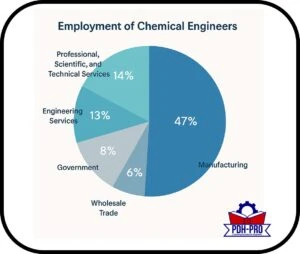Introduction
Chemical engineering touches just about every part of our lives—whether people realize it or not. From the fuel in our cars to the medications in our cabinets, chemical engineers are the folks behind the scenes making sure raw materials are turned into useful, reliable products. I’ve spent over three decades in the profession, and I can tell you firsthand: it’s a field that demands both sharp technical skills and a good deal of practical judgment.
To become a chemical engineer, you’ll need a degree from an ABET-accredited program, strong problem-solving skills, and a solid grasp of math and science. The path also includes passing the FE and PE exams and gaining hands-on experience. Learn what steps to take—and what skills you’ll need—for a successful career in chemical engineering.
If you’re thinking about becoming a chemical engineer—or helping guide someone who is—it helps to understand what’s involved. This article lays out the basics: the kind of education you’ll need, how licensure works, and what kind of jobs are out there.
Related Articles:
What Does It Take to Become a Bioengineer
What Does It Take to Become an Environmental Engineer
What Do Chemical Engineers Do?
Chemical engineers figure out how to turn raw materials into useful products—and how to do it safely, efficiently, and at scale. Whether it’s developing cleaner fuels, formulating new pharmaceuticals, or designing systems to produce everything from food additives to plastics, they’re behind many of the processes that keep modern industry running.
They’re found in a wide range of settings—refineries, manufacturing plants, research labs, even consulting and policy roles. At the core, it’s about solving practical problems: reducing waste, improving process reliability, lowering energy use, and ensuring that systems operate within environmental and safety guidelines.
To understand the broader impact of engineering across all disciplines, you can explore why engineering is so essential here.
Educational Requirements for Chemical Engineers
If you’re serious about becoming a chemical engineer, your first step is earning a bachelor’s degree from an ABET-accredited program. That’s non-negotiable if you plan to get licensed later on. The coursework is rigorous—expect plenty of chemistry, physics, calculus, and core engineering classes. You’ll also dive into specialized topics like thermodynamics, fluid mechanics, process control, and reaction engineering.
Most programs include lab work and design projects to help you apply what you’ve learned. These hands-on experiences are critical—they teach you how to solve real problems, not just pass exams. Some students also take part in internships or co-op programs, which are great for building practical skills and making connections in the field.
While a bachelor’s degree is enough for many roles, some engineers go on to earn a master’s or Ph.D., especially if they’re headed into research, academia, or high-level process design. But for most, a solid undergraduate education—combined with on-the-job experience—is the foundation of a rewarding career.
How to Become a Licensed Professional Chemical Engineer
Getting licensed as a Professional Engineer isn’t required for every chemical engineering job, but it’s a valuable credential—especially if you want to take legal responsibility for projects, sign off on designs, or move into leadership roles. In many industries, it’s a mark of trust and experience that sets you apart.
Here’s how the typical path to licensure works:
- Earn a Bachelor’s Degree: Complete an ABET accredited chemical engineering program.
- Pass the Fundamentals of Engineering (FE) Exam: Typically taken right after graduation.
- Gain Work Experience: Accumulate 4 years of experience under a licensed engineer.
- Pass the PE Exam: After gaining experience, pass the chemical engineering PE exam to become licensed.
Each state has its own licensing board with slightly different requirements, so it’s worth checking with your state early in the process. But the general structure is pretty consistent across the U.S.
Even if you don’t need a PE license for your current job, having it can open doors down the road—especially in consulting, public-sector work, or roles where regulatory compliance and safety reviews are front and center.
Check out this video about careers in chemical engineering.
Chemical Engineer Salaries and Earning Potential
Chemical engineers enjoy competitive salaries that reflect the complexity and importance of their work. The median annual salary for chemical engineers is approximately $112,100, though this can vary based on experience, location, and industry.
Engineers working in specialized fields like petroleum or chemical manufacturing often earn significantly more, with the top 10% of professionals earning over $168,000. Additionally, obtaining a PE license can enhance earning potential by qualifying you for more advanced and leadership roles.
Here is a table listing the average annual salaries for chemical engineers at various experience levels.
| Job Title | Average Annual Salary (USD) |
| Entry-Level Chemical Engineer | $ 75,000.00 |
| Mid-Level Chemical Engineer | $ 95,000.00 |
| Senior Chemical Engineer | $ 120,000.00 |
| Chemical Engineering Manager | $ 140,000.00 |
| Chemical Engineer with PE License | $ 130,000.00 |
Continuing Education for Chemical Engineers
To stay competitive in the ever-evolving field of chemical engineering, it’s crucial to keep your skills and knowledge up to date. Our continuing education courses provide a wide range of learning opportunities tailored to chemical engineers.
With over 40 courses available, you can choose from live webinars, recorded webinars, and self-directed courses to fit your schedule and learning preferences. Whether you’re looking to fulfill licensure requirements or deepen your expertise in specialized topics like process optimization or chemical safety, these courses are designed to support your professional growth while keeping you ahead in the field.
Career Path and Advancement Opportunities
The career path for chemical engineers is diverse and filled with opportunities for advancement. Starting as an entry-level engineer, you’ll focus on designing and optimizing processes for chemical production, often working alongside technicians and other engineers. As you gain experience, you can advance to mid-level and senior roles, where you’ll take on more complex projects and leadership responsibilities.
For those with a PE license, doors open to higher-level positions such as chemical engineering manager or project lead, where you’ll oversee teams and manage large-scale operations. Specializing in areas like biotechnology, energy, or environmental engineering can further accelerate your career and lead to consulting or executive roles.
Continual professional development, through continuing education and advanced degrees, is key to unlocking these opportunities and staying at the forefront of innovation in the field.
Conclusion
Becoming a chemical engineer is a rewarding journey that combines technical expertise with creative problem-solving. With the right education, licensure, and commitment to continuous learning, you can build a successful career in a wide range of industries. Whether you’re just starting out or looking to advance, chemical engineering offers numerous opportunities for growth and impact.
